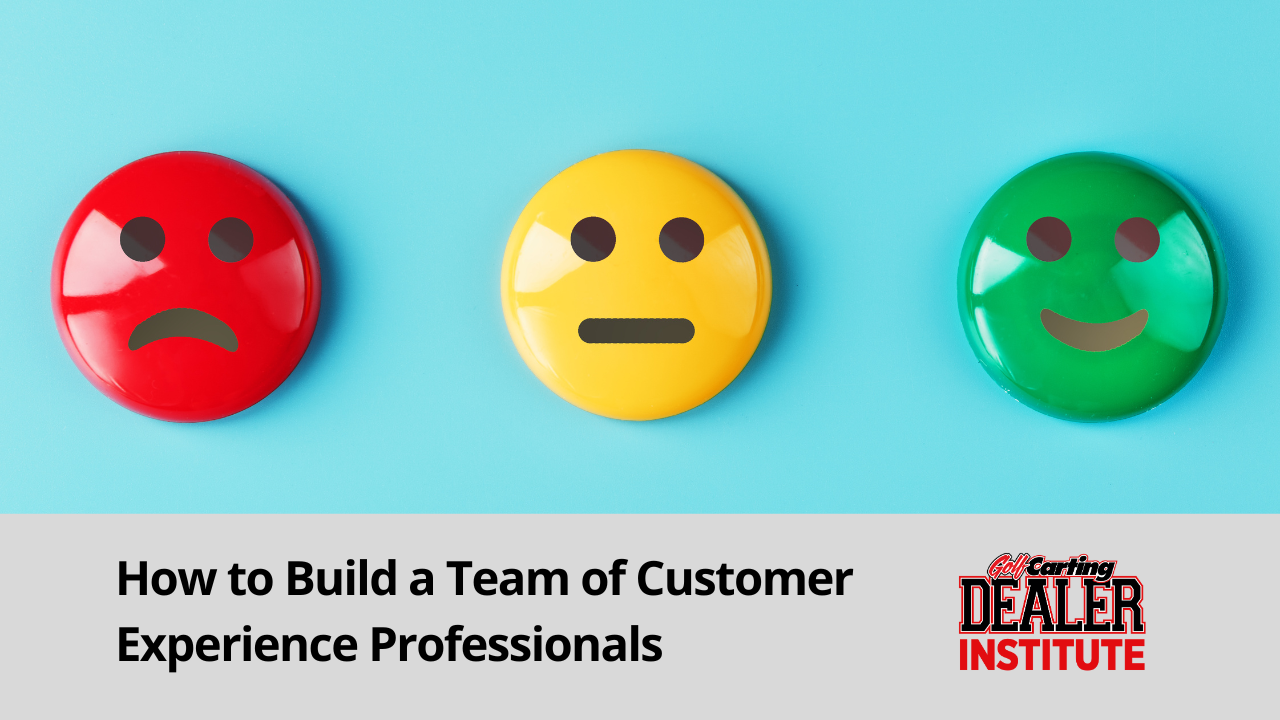Building a Team of Customer Experience Professionals: An Educational Approach for Golf Cart Dealers
Dec 05, 2024
Creating a culture of customer service excellence starts with education, not just training. While training teaches specific tasks and procedures, education develops deeper understanding and instills the values that drive exceptional customer experiences. This guide will help you transform your team into true customer experience professionals who build lasting relationships and drive business growth through genuine care and expertise.
Understanding Your Customer's Journey
Before diving into specific educational approaches, it's crucial for your team to understand the complete customer experience. A golf cart purchase isn't a simple transaction – it's often a significant investment that begins long before the customer walks through your door and continues well after they drive their cart home.
The journey typically begins with research, as customers explore options online and gather recommendations. Their first direct contact might be a phone call, email, or visit to your showroom. The sales process involves cart selection, feature demonstrations, and purchase negotiations. After delivery, the relationship continues through service visits, parts purchases, and eventual trade-in discussions.
Each stage of this journey presents unique opportunities for your team to demonstrate expertise, build trust, and exceed expectations. By understanding this journey holistically, team members can better anticipate and serve customer needs at every touchpoint.
Foundational Elements of Customer Experience Excellence
The Art of First Impressions
First impressions set the tone for every customer relationship. Teaching your team the art of creating positive first impressions goes beyond basic greeting protocols. Help them understand the psychology of first encounters – how tone of voice, body language, and environmental factors all contribute to a customer's comfort level and willingness to engage.
Great first impressions aren't scripted – they're authentic interactions that make customers feel valued and welcomed. Encourage your team to develop their own authentic style while maintaining professional standards.
Mastering Active Listening
Active listening is perhaps the most crucial skill in customer service. Your team needs to understand that listening isn't just about hearing words – it's about understanding needs, both stated and unstated. Teach them to ask thoughtful questions, take meaningful notes, and read between the lines.
When team members truly listen, they can provide solutions that customers might not even know they need. This level of attention builds trust and demonstrates expertise.
Developing Deep Product Knowledge
Product expertise builds confidence – both for your team and your customers. However, simply memorizing specifications isn't enough. Help your team understand how different features benefit different types of users. Teach them to match product features with customer needs, lifestyle, and preferences.
This knowledge should extend beyond your current inventory to include industry trends, competing products, and emerging technologies. The goal is to position your team as trusted advisors, not just salespeople.
Ongoing Educational Methods
Weekly Team Discussions
Transform traditional meetings into interactive learning sessions. Use this time to share customer feedback, discuss challenging situations, and collaborate on solutions. These discussions should be open forums where team members feel comfortable sharing both successes and failures as learning opportunities.
Monthly Skill Enhancement
Dedicate time each month to developing specific skills. This might involve bringing in industry experts, studying successful case studies, or practicing new techniques. Focus on one key area each month, allowing for deep understanding rather than surface-level knowledge. Golf Carting Dealer Institute offers a variety of content, case studies, and courses to help.
Quarterly Review and Development
Use quarterly reviews as opportunities for two-way learning. Ask team members about their challenges and insights. What are they hearing from customers? What processes could be improved? These conversations often reveal valuable insights that can benefit the entire organization.
Measuring Success Through Customer Experience
Success in customer experience isn't just about sales numbers. Teach your team to value and track various indicators of customer satisfaction:
- Genuine customer feedback and testimonials
- Repeat business patterns
- Referral rates
- Long-term service retention
- Online reviews and ratings
- Customer loyalty indicators
Creating Specialists Across Departments
Each department requires specialized knowledge while maintaining a unified approach to customer service. Sales team members need deep product knowledge and needs assessment skills. Service staff must combine technical expertise with clear communication abilities. Parts department personnel should understand both inventory management and customer education.
The key is helping each team member see how their role contributes to the overall customer experience. When everyone understands their part in the bigger picture, they're more likely to take ownership of customer satisfaction.
Building a Culture of Continuous Improvement
Customer service excellence isn't a destination – it's an ongoing journey. Create an environment where team members are encouraged to:
- Share insights and observations
- Suggest process improvements
- Learn from both successes and mistakes
- Stay current with industry trends
- Maintain enthusiasm for customer satisfaction
Regular feedback from both customers and employees should drive continuous refinement of your educational approach. What works today might need adjustment tomorrow as customer expectations evolve.
Conclusion
Building a team of customer experience professionals requires a commitment to education that goes beyond basic training. By helping your team understand the complete customer journey, develop crucial skills, and maintain a learning mindset, you create a foundation for lasting success.
Remember that every team member has the potential to become an exceptional customer service professional. Your role is to provide the knowledge, support, and opportunities they need to reach that potential. When you invest in their development, you invest in your dealership's future.
The most successful dealerships aren't just selling golf carts – they're creating experiences and relationships that last. By educating your team to excel in customer experience, you're building a reputation that will drive business growth for years to come.

